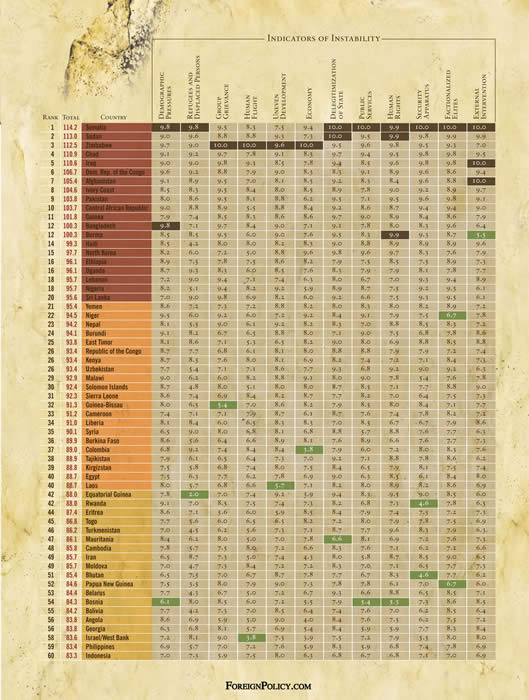Failed States Index 2008'
by Foreign Policy, July/August 2008
|
Sri Lanka is third worst in the world for Group Grievances, behind Sudan & Iraq.
|
Whether it is an unexpected food crisis or a devastating hurricane, the world’s weakest states are the most exposed when crisis strikes. In the fourth annual Failed States Index, FOREIGN POLICY and The Fund for Peace rank the countries where state collapse may be just one disaster away.
Sri Lanka is #20 in the index of failed states, with Somalia holding the #1 spot. Sri Lanka's condition is considered critical, with a total instability score of 95.6 out of 100.
Demographic pressures = 7.0
Refugees & Displaced Persons = 9.0
Group Grievances = 9.8
Human Flight = 6.9
Uneven Development = 8.2
Economy = 6.0
Delegitimization of the State = 9.2
Public Services = 6.6
Human Rights = 8.0
Security Apparatus = 9.3
Factionalized Elites = 9.5
External Intervention = 6.1
Sri Lanka is third worst in the world for Group Grievances, behind Sudan & Iraq.

Interactive index here.
Of interest to Sri Lanka in the future is that the index draws a relationship between inflation and instability here. "[I]
t’s easy to see how rapid increases in the cost of basic goods can cause chaos. Countries with high levels of inflation are also the world’s weakest, according to data from the Heritage Foundation’s Index of Economic Freedom."
Q: What does “state failure” mean?
A: A state that is failing has several attributes. One of the most common is the loss of physical control of its territory or a monopoly on the legitimate use of force. Other attributes of state failure include the erosion of legitimate authority to make collective decisions, an inability to provide reasonable public services, and the inability to interact with other states as a full member of the international community. The 12 indicators cover a wide range of elements of the risk of state failure, such as extensive corruption and criminal behavior, inability to collect taxes or otherwise draw on citizen support, large-scale involuntary dislocation of the population, sharp economic decline, group-based inequality, institutionalized persecution or discrimination, severe demographic pressures, brain drain, and environmental decay. States can fail at varying rates through explosion, implosion, erosion, or invasion over different time periods.
|  Home
Home Archives
Archives